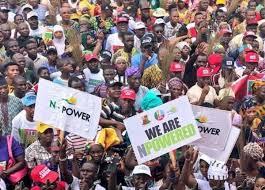
Unemployment-N-Power and Direct Labor not Remedies-Prof. Olagoke
- By solomon2day
- On 09/07/2020
- Comments (0)
- In Special Report
 The Federal Government is in the process of recruiting 774,000 Nigerians through the National Directorate of Employment(NDE). Those recruited shall come from the 774 Local Governments in the country-1,000 per Local Government. The jobs are direct labor in nature and the beneficiaries shall receive N20,000 per month for three months.
The Federal Government is in the process of recruiting 774,000 Nigerians through the National Directorate of Employment(NDE). Those recruited shall come from the 774 Local Governments in the country-1,000 per Local Government. The jobs are direct labor in nature and the beneficiaries shall receive N20,000 per month for three months.
However, Nigerians have have expressed worries that Senators, House of Representatives members, Ministers, State Governors and political party stalwarts may influence the recruitment process.
They lament that the jobs are temporary and the number of those to be recruited is insignificant considering the very high unemployment rate in the country.
In this interview, the Founder, Spiritual Head and Grand Imam of Shafaudeen-in-Islam, Prof. Sabitu Olagoke opines that the N-Power, Tradermoni and the Direct Labor schemes are not remedies for the worrisome state of unemployment in the land. Excerpts :
Do you think that recruitment of 774 Nigerians as direct labor workers shall address the high rate of unemployment in the country ?
Unemployment saga in Nigeria as it affects mostly the youths and graduates has aggravated sinister development in terms of banditry, insurgency, armed robbery and rape for rituals to mention just a few, leading to the general state of insecurity even amidst the panic of the coronavirus pandemic.
The partial pittance of distribution of palliatives which was highly short lived exposed Nigeria’s poor state of welfare and high poverty level in terms of our population as if we are just recovering from famine and war.
Unfortunately, there is no sense of remorse or state of regret on the part of the elite, whose contribution to the impoverishment of the masses are obvious and with no place to hide as in billions of Naira worth because of the advantage of either been in government or the corridors of power. Nigeria today is known as the world headquarters of poverty and corruption, instead of addressing this, they care less about the North which could be said to be the epicenter of poverty.
The great challenge before government is to redouble their efforts in working on this for Nigeria to be more habitable.
Government pretends to be responding to the cries of the people by rolling out a plan to solve the problem of poverty by initiating employment opportunities for 774,000 Nigerians with 1,000 candidates per Local Government.
However, the feasibility study for its effectiveness is yet to be done while the modalities for identifying the poorest of the poor continues to be a game of political jingoism because during the palliative distribution to cushion the effect of the lock down in the scanty and selected areas, even within each state’s geographical contraption.
The faces of most of the people who received the pittance of token were known to be working class and well fed. The society is yet to know how government was able to fish out the poorest of the poor.
During the N-Power program meant to reduce poverty by cushioning the effect on the unemployed youth in the society, most especially the unemployed graduates, research statistics showed that most of the beneficiaries were already engaged in various places of work, making a jamboree out of the exercise.
After two years of benefiting from the program, the beneficiaries flooded the already saturated labor market, thereby making the exercise to have no impact, while their counterparts with lesser certificates and grades, who happen to be offspring of the elite and people in government easily get absorbed into choice places of work-CBN, NNPC, NSE etc.
Government’s gesture of employing 774,000 Nigerians, though of very low impact, would have been commendable, if not for the fact that it is menial in nature, the wage of N20,000 is not impressive and the number to be recruited is too small compared to the number of unemployment youths, graduates and artisans alike.
This situation makes one wonder why successive governments have always been failing to promote the cause of our future leaders.
Unemployment became an issue in Nigeria in the year 2006 when it rose to 6 per cent, by the year 2011 it rose to 11.6 per cent , 2014 it was 19.6 per cent, in 2016 it rose to 23.9 per cent.
Despite all policies leading to the emergence of various economic interventions like OFN, Family Support, Better Life for Rural Women, DFFRI and Sure P, policy somersault rendered all of these ineffective and useless in the face of institutional indiscipline, corruption and lack of patriotism for Nigeria.
Till date our attitude has never changed, but grows worse under every government despite their campaign for positive changes.
The areas of international embarrassment included the recruitment process with over bearing influences of the State Governors, Ministers, Senators, House of Representatives members and party leaders.
Since the poorest of the poor are expected to reside in the Local Governments and communities that are remote, one should expect in a sane society therefore that the responsibility of recruiting candidates should be that of the Local Government chairmen, but for their questionable autonomy. Sadly, in Nigeria the masses are only relevant during the voting period, but are inconsequential after the elections by the people who they voted into power. Is this not a costly paradox of life ?
For this project to be of any meaningful impact, the Federal Government must increase the numbers to key into satisfying at least on third of the verifiable number of people suffering from the saga of unemployment, while their remuneration must be to the least value of the minimum wage or that of the National Youth Service Corps(NYSC) members. N-Power, Tradermoni and the direct labor schemes are not remedies to our state of poverty and unemployment in the face of the gruesome level of the challenges of insecurity confronting the nation.
Much as the number of universities are not sufficient enough, the number of graduates who are unemployed should be reduced drastically either by providing jobs or establishing vocational training centers under TIVET to accommodate large numbers of people who are unemployed and to justify the teaching of entrepreneurial courses in our institutions of higher learning while government must revisit the poor state of our Technical colleges for facility update in order that we are able to produce more craftsmen, whose graduates would be able to source for loans through accredited people’s banks for the purpose of becoming job creators for others to patronize and for them to be self employed.
Besides this, most of our artisans are highly unskilled, they have caused a lot of damage on projects assigned to them.
Revived Technical colleges equally come to the rescue of giving them short term courses that would improve their proficiency with some elements of rudimentary level of managerial skills.
Only such holistic approach which is youth focused and centered can solve the challenges of the dependents which every expected working class should bear to satisfy their socio-spiritual responsibilities for peace to reign.
Above all, the issue of stable and regular electricity supply is equally germane to the survival of small and medium scale industries for the realization of genuine industrialization to be realized.
Nigeria Governance Unemployment Prof. Sabitu Olagoke








